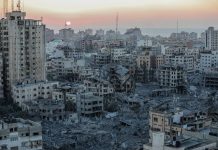Beirut: The capital of Lebanon, fabulous Beirut – once known as the “Paris of the Arab world” – has been going through hard times since the middle of the last century. The civil war, political and religious tensions for many years did not allow this small country with a very rich culture to develop.
“The one who rules Lebanon, namely Beirut, rules the Middle East,” the country’s people say rather reasonably. Indeed, in Lebanon, the interests of not only neighboring Syria and Israel, but also Turkey, Russia, the US and other Western countries have historically collided.
Meanwhile, as it’s known, political chaos, military clashes and civil wars often provide fertile grounds for the flourishing of terrorist organizations.
So, one of them, odious ASALA, was established during the civil war in 1975 in Beirut by Lebanese Armenian Hakob Hakobyan, who took part in the activity of the Palestinian armed organizations in the early 1970s.
Lebanon, being an Arab country, is a member of the Organization of Islamic Cooperation, and so it’s logical that Baku expects from it an unequivocal support in the issue of the Armenian-Azerbaijani Nagorno-Karabakh conflict. But, unfortunately, the Lebanese authorities still have not provided much-needed political support to Azerbaijan. Only once the ex-Prime Minister of Lebanon Saad Al Hariri said that his country stand for a peaceful solution to the conflict.
Surely, the main reason for this paradoxical behavior is the influence of the Armenian community and the Armenian lobby on the Lebanese authorities.
Nevertheless, despite thecourse of official Beirut, ordinary Lebanese people are exhausted by the lies of the Armenians, who position themselves allegedly as a”long-suffering nation”.
As it’s known, on August 4, a massive explosion occurred in the port of Beirut, as a result of which hundreds were killed and more than four thousand Lebanese citizens were injured. The whole world was shocked by this incident.
According to one of the versions, the explosion was caused by 2,700 tons of ammonium nitrate stored in the port warehouses.
World leaders expressed their condolences to Lebanon’s president.
The next day after the tragedy, Azerbaijani President Ilham Aliyev sent a letter of condolences to Lebanese President Michel Aoun, in which he expressed the solidarity of the Azerbaijani people with the people of Lebanon.
“The Republic of Azerbaijan will render financial aid to the friendly Republic of Lebanon to help eliminate the consequences of this tragedy,” the head of the Azerbaijani state wrote. On the same day, Azerbaijani Prime Minister Ali Asadov signed an order on provision of financial assistance to the country. – Agencies





